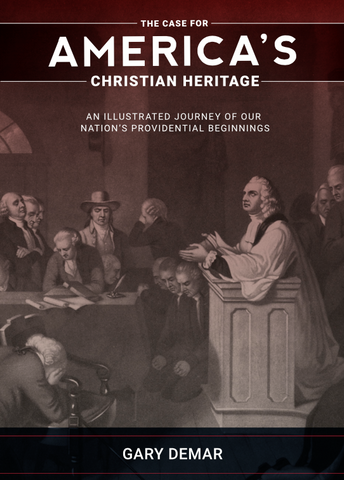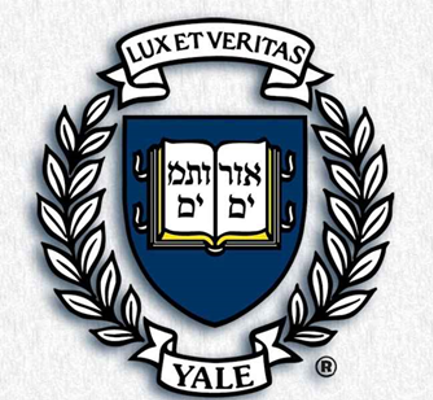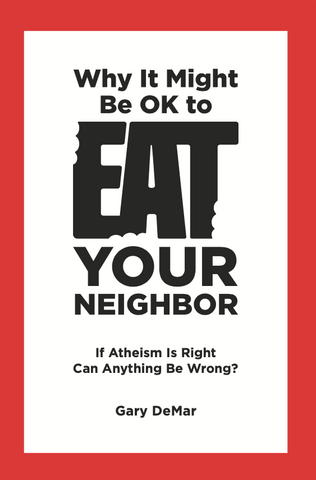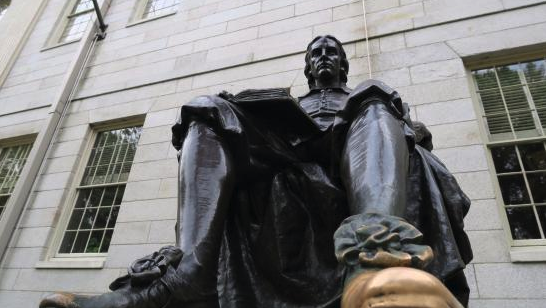The battle for America is being fought on two fronts: In the courts and the universities. If these two institutions remain in the hands of liberals, reversing anti-Christian trends will take decades longer. The universities feed the law schools, the law schools corrupt the minds of impressionable law students, and the courts maintain the status quo. Our colonial founders understood that the garden of the nation grows from the seeds that are planted in its schools.
Harvard University was founded with one instructor and nine students with the goal to establish a school to train Christian ministers. The school was named after John Harvard (1607–1638), a clergyman from Charlestown, Massachusetts, who left his library and half his estate to the fledgling institution. The Massachusetts Bay Colony was so grateful for the library that the original Charter stated, “It is ordered that the Colledge agreed upon formerly to bee built at Cambridg shalbee called Harvard Colledge.”

The statue of John Harvard that sits outside University Hall in Harvard Yard states that he founded the institution in 1638. He was not the founder, and Harvard was founded in 1636. In fact, since there was no official likeness of Harvard, the depiction of him is of someone else. Some say it was a student; others claim it was the third president of Harvard. This is why the statue is known as “The Statue of Three Lies,” a scene that appears in the film The Social Network. The statue stands as a testimony to so many additional lies that have come out of our nation’s schools that are destroying the moral integrity of America.
Gary North offers this perspective on Harvard:
The humanists in the U.S. spotted what was obvious by the eighteenth century: the key institution to capture was the college. This institution trained the nation’s professionals, especially ministers. Thus, they began a program of infiltration and subversion. The Unitarians captured Harvard in 1805. The rest of the colleges followed. Humanists could certify everyone else by making Harvard, Yale, and finally Princeton University (after Woodrow Wilson’s coup in 1902) the prestige universities, i.e., the certifying universities. They also imported the graduate school and the Ph.D. degree from Prussia, which had been the German-speaking model for capturing the academic certification system. It was all a top-down operation. They screened all those who hoped to become certified and to certify, and they also persuaded all the professions that certification was mandatory.
A headline of an article in the Boston Evening Globe from May 27, 2006, which no longer appears on its website, described what a former dean said about Harvard. A portion of the article found at GaryNorth.com:
Harvard University leaders are running the school like “a day care center for college students,” trying to dazzle undergraduates with concerts and a new pub, rather than teaching them to be responsible citizens, a former Harvard dean writes in a newly released book.
Harry R. Lewis—the former dean of Harvard College [from 1995 to 2003], who many believe was pushed out of his post for being critical of President Lawrence H. Summers—writes that the university has gone off track in a number of ways. His book is Excellence Without a Soul: How a Great University Forgot Education [2006] published earlier this month [May 2006] by PublicAffairs…. With its emphasis on customer satisfaction, the university pays too little attention to students’ development as moral citizens, Lewis said.
The following is from a review of Lewis’ book and one of its main conclusions:
Harvard has abdicated its core responsibility to decide what undergraduates ought to learn and has abandoned any effort to shape students’ moral character. “I have almost never heard discussions among professors,” writes this 30-year veteran of the computer-science department, “about making students better people.”
His book was reissued as Excellence Without a Soul: Does Liberal Education Have a Future? Given education’s lack of bedrock foundational principles, so-called liberal education does not have a future. I hope more people figure it out before it’s too late.
Harvard and other once-Christian institutions of higher learning have abandoned their foundational principles. Without them, we are left with this from atheist homosexual Yuval Noah Harari who works with George Soros: “Human rights, just like God in heaven, are just a story that we’ve invented.” Is it any wonder that antisemitism is rampant on many college campuses and homosexuality and transgenderism are celebrated? If “human rights” are manufactured, then they can be made not to apply to anyone. Mark, Stalin, and Hitler would have agreed with Harari.
In accordance with its original vision, Harvard adopted a set of “Rules and Precepts” in 1646 that stated the following (spelling has been modernized):
Let every student be plainly instructed, and earnestly pressed to consider well, the main end of his life and studies is, to know God and Jesus Christ which is eternal life (John 17:3) and therefore to lay Christ in the bottom, as the only foundation of all sound knowledge and learning. And seeing the Lord only gives wisdom, Let everyone seriously set himself by prayer in secret to seek it of him (Prov. 2:3).
See Chapter 5 of my book The Case for America’s Christian Heritage for a study of America’s early Christian colleges.

The Case for America's Christian Heritage
It’s not enough to relive history. There’s much work before us to reset the foundation stones of a firm reliance on Divine Providence. We need to heed the words of Benjamin Franklin who quoted Psalm 127:1 during the drafting process of the Constitution: “except the Lord build the house they labor in vain that build it,” and “that without His concurring aid we shall succeed in this political building no better, than the Builders of Babel.” The principles that were true and necessary centuries ago for building nations are equally true and necessary today.
Buy NowIn 1692, Harvard adopted the motto Veritas Christo et Ecclesiae: “Truth for Christ and the Church.” The phrase was embedded on a shield and can be found on many buildings around the Harvard campus and various dorms in Harvard Yard.
The books on the shield represent revelation and reason. The top two books that are shown face-up represent the Word of God revealed to us in the Old and New Testaments. The book on the bottom of the shield, which faces down, symbolizes the limits of reason and the need for God’s revelation.
A second and earlier (1650) Harvard motto carried the Latin phrase, In Christi Gloriam, “For the Glory of Christ.” Samuel Eliot Morison, in his history of Harvard, writes, “Like the Medieval schoolmen, [the founders] believed that all knowledge without Christ was vain. Veritas to them … meant the divine truth.” If that were only true today.
Yale was founded because of Harvard’s theological drift and its commitment to Jesus Christ:
All scholars shall live religious, godly, and blameless lives according to the rules of God’s Word, diligently reading the Holy Scriptures, the fountain of light and truth; and constantly attend upon all the duties of religion, both in public and secret.
Yale’s original motto, written in Hebrew (אורים ותמים) and Latin (Lux et Veritas) is “Light and Truth.” The open book in the middle of the seal is the Bible.

The Latin word Veritas—“Truth”—is common to both seals. It’s a shame that most of today’s colleges and universities despise foundational truth, ultimate truths that are necessary for even conceiving the ideas of truth and morality, so they can create their own “truth.” This means that what’s true for you may not be true for me, and what you may claim is true is not true at all. The consequences of this type of thinking, which is prevalent in many of our nation’s universities, is the first step in the creation of moral numbness. Why It Might Be OK to Eat Your Neighbor repeatedly raises the issue of accounting for the conscience, good and evil, loving our neighbor, and the foundation of what makes anything true.

Why It Might be OK to Eat Your Neighbor
The most damning assessment of a matter-only cosmos devoid of a Creator is that we got to this place in our evolutionary history by acts of violence whereby the strong conquered the weak with no one to support or condemn them. Why It Might Be OK to Eat Your Neighbor repeatedly raises the issue of accounting for the conscience, good and evil, and loving our neighbor. It’s shocking to read what atheists say about a cosmos devoid of meaning and morality.
Buy NowIt’s shocking to read what the truth deniers say about a cosmos devoid of meaning and morality.

